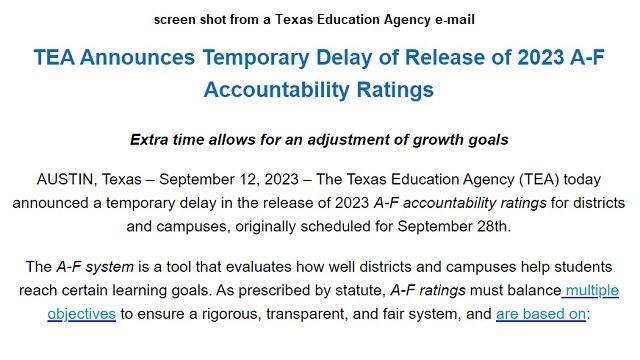
The Texas Education Agency (TEA) has thrown another curve at public school districts by announcing another delay in releasing accountability ratings.
TEA’s announcement came the day after the Bryan ISD school board heard what administrators are doing to prepare students for the state’s new accountability system.
Board president Julie Harlin said “rather than just complaining about that (the TEA), and I don’t think anyone in this room has ever said we don’t have work to do. We always know there is more work to do. We can always be moving our students forward.”
The takeaway from superintendent Ginger Carrabine, was that the district is not going to fall victim to circumstances created by the TEA, adding “it is what it is. Everything that we know about the assessment and the accountability system was changed. And we’re not going to just stand by and wonder what to do.” “And I think everyone feels very confident with what is happening in our schools right now.”
Quoting a news release about TEA’s postponement of releasing A-F district and campus grades from the 2022-23 last year, the state agency wants “to ensure ratings reflect the most appropriate goals for students.”
Click below to hear comments from the September 11, 2023 Bryan ISD school board meeting.
News release from the Texas Education Agency:
The Texas Education Agency (TEA) today announced a temporary delay in the release of 2023 A-F accountability ratings for districts and campuses, originally scheduled for September 28th.
The A-F system is a tool that evaluates how well districts and campuses help students reach certain learning goals. As prescribed by statute, A-F ratings must balance multiple objectives to ensure a rigorous, transparent, and fair system, and are based on the better of:
- a) Achievement – how well all students have learned certain academic content – and
- b) Progress – how much all students have gained academically over the course of the year
- along with (c) Closing the Gaps – how well schools raise academic performance among certain groups of students.
The postponement of ratings for approximately one month will allow for a further re-examination of the baseline data used in the calculation of Progress to ensure ratings reflect the most appropriate goals for students. The final ratings methodology will be posted once this analysis of the growth data is complete, and about two weeks later, A-F ratings will be issued for parents, educators, and the public to use to help Texas schools continue to improve.
“Maintaining high expectations helps guide our efforts to improve student learning and support,” said Texas Education Commissioner, Mike Morath. “The A-F system is designed to properly reflect how well our schools are meeting those high expectations, and the adjustments we are making this year will ensure it continues to serve as a tool for parents and educators to help our students.”
Background on the Periodic Update of A-F Indicators and Cut Points
Prior to 2017, cut points and indicators in the accountability system were updated annually, preventing school systems, parents, and the public from easily comparing year-over-year performance of our schools in reaching goals for students across the state. Cut points are the specific numerical targets that districts and campuses must reach in order to receive a particular letter grade. Since the passage of House Bill (HB) 22 in 2017, state law requires cut points and indicators in the accountability system to be updated periodically, not necessarily annually, to achieve the statutory goals of reducing achievement gaps and ensuring Texas is a national leader in preparing students for success after graduating. Given this policy change, cut points and indicators in the A-F system have remained largely unchanged since 2017.
With unchanged cut points and methodology, data from the last five years has provided educators and the public with an effective way to evaluate improvement. However, to ensure our schools are meeting goals for students, state law requires updates to A-F indicators, which are happening this year as part of an A-F system refresh. During this refresh year, year-over-year comparisons are more difficult to make. To help provide a year-over-year comparison, “what if” re-evaluations will also be publicly released using last year’s data with this year’s cut points and methodology.
Preparations for the refresh began in earnest in October 2021. To ensure the refreshed system remains rigorous, transparent, and fair, TEA engaged and sought input from thousands of interested individual Texans including parents, teachers, superintendents, school board members, community advocates, and business leaders. As part of the refresh, in January 2023, TEA published proposed cut points and updates to previously published methodology changes. Feedback obtained to that point included recommendations to appropriately account for the impact of the COVID-19 pandemic in evaluating new baseline data, so in the portion of the system that evaluates school progress, TEA proposed setting goals using a baseline of the average level of student growth for the 2018-19 and 2021-22 school years.
However, since that time, statewide growth data for the 2022-23 school year has become available. Analysis of that growth data shows that the 2021-22 growth was more anomalous than expected, so setting baselines that partially incorporate data from the 2021-22 school year may not adequately take into account the impact of the pandemic.
As a result, TEA is delaying the issuance of the final rule for the accountability manual and delaying the issuance of ratings to conduct further analyses of the growth data to inform cut scores in Domain 2a- Academic Growth, and Domain 3-Closing the Gaps. Additional details on this delay were shared today with school systems.
State law requires that A-F ratings be issued each school year. A study on the Texas accountability system shows that publicly reported school performance systems help students, especially those who are at high risk of dropping out of school and/or are economically disadvantaged.
